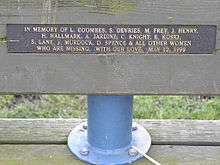Missing Women Commission of Inquiry

The Missing Women Commission of Inquiry was a commission ordered by the Lieutenant Governor in Council on September 27, 2010 to evaluate the response of law enforcement to reports of missing and murdered women. The commission had four mandates:
- to evaluate the response of the police to reports of missing women from Downtown Eastside of Vancouver,
- to evaluate the reasons for staying charges against Robert Pickton in January 1998,
- to recommend changes regarding how missing women and suspected homicides are handled, and
- to recommend changes to how cases are handled when they involve more than one investigating organization.
In 2012, the Commission issued a final report which included a number of recommendations. The Missing Women Commission of Inquiry closed its office on August 1, 2013.
Robert Pickton
On December 9, 2007, Robert Pickton, a pig farmer from Port Coquitlam, was convicted of second-degree murder in the deaths of six women. He was also charged in the deaths of an additional 20 women, many of them from Vancouver's Downtown Eastside; however, these charges were stayed by the Crown in 2010. In December 2007, he was sentenced to life in prison, with no possibility of parole for 25 years – the longest sentence then available under Canadian law for murder.
After Pickton's arrest, there was increased attention on a prior attempted murder charge of a prostitute in March 1997. He was alleged to have stabbed her several times during an altercation at the farm. The victim informed police that Pickton handcuffed her, but that she escaped after suffering several lacerations, disarming him, and stabbing him with his weapon. The charge was dismissed in January 1998. The mandate of the commission included evaluating why the 1997 charges against Pickton were stayed.
Similar projects
The high profile of the BC investigation caused other Canadian jurisdictions to create new task forces to deal with missing persons cold cases. Often these cases involve marginalized women, including sex workers, drug users, and Aboriginals. In Manitoba, Project Devote was looking for 28 people as of 2012.[1] Since 2003, Project KARE has been looking for "cases of murdered or missing high risk persons from all parts of Alberta".[2]
Criticism
Human rights organizations the B.C. Civil Liberties Association, Pivot Legal Society and West Coast LEAF have condemned the inquiry for its failure to include the voices of marginalized women. 15 groups representing the interests of marginalized people were initially granted standing at the inquiry but pulled out of the process in protest after being denied funding.[3]
See also
References
- ↑ "Task force's list of missing or murdered down to 28 people". www.winnipegfreepress.com. Retrieved 2017-08-04.
- ↑ "Archived copy". Archived from the original on 2013-03-16. Retrieved 2012-07-23.
- ↑ Missing Women Inquiry condemned as a failure by B.C. human rights groups Retrieved 19 Nov 2012
External links
- Missing Women Commission of Inquiry
- http://www.ammsa.com/category/tags/aboriginal-women
- https://web.archive.org/web/20070101120047/http://www.ctv.ca:80/servlet/ArticleNews/story/CTVNews/1077327542003_15/?hub=Canada
- https://web.archive.org/web/20070212093108/http://www.rcmp-bcmedia.ca:80/missing_women.jsp
- https://web.archive.org/web/20061007025339/http://www.missingpeople.net/home.html